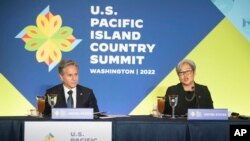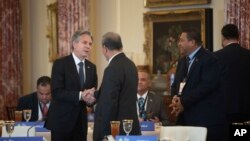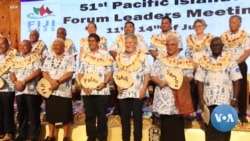The United States says it has reached a "shared vision" of partnership with Pacific Island nations, including new pledges of U.S. assistance, as concern grows about China's expanding influence in the region.
On Wednesday, the U.S. began its first-ever in-person summit with leaders from about a dozen island nations spanning vast stretches of the Pacific Ocean.
U.S. President Joe Biden will deliver remarks to Pacific Island leaders at the State Department on Thursday, then host a dinner at the White House.
"We have come together around a declaration of partnership between the U.S. and the Pacific," U.S. Secretary of State Antony Blinken said while holding up a document during Wednesday's working luncheon with Pacific leaders at the State Department.
But the final language of a reported 11-point joint declaration is still being hammered out.
The Solomon Islands sent a diplomatic note to the regional Pacific Islands Forum announcing it would not sign the declaration during the high-profile gathering.
The declaration, which was drafted after several weeks of negotiations between Pacific Island nations and Biden administration officials, covers issues such as practicing sustainable development, tackling climate change, and preserving the security of the Pacific region and its trade.
But the note from the Solomon Islands says the government and parliament need more time to study the declaration. Prime Minister Manasseh Sogavare is in Washington, however, and is taking part in the summit, a senior administration official said.
Blinken announced Wednesday that the U.S. would contribute $4.8 million to a new program called Resilient Blue Economies that will strengthen marine livelihoods in the Pacific Islands by supporting sustainable fisheries, aquaculture and tourism.
"Pacific Islanders are generally more interested in the conversation than in the immediate deliverables from the summit," said Brian Harding, a senior expert on Southeast Asia for the U.S. Institute of Peace.
Harding told VOA on Wednesday that "some leaders have understandably seen the joint declaration as having been rushed and ultimately are looking for whether the United States will follow through with its commitments and be consistent with its engagement moving forward."
Other experts said this week's summit remedies what some see as Washington's inattention to Pacific Island nations.
A senior Biden administration official said that during the summit, the White House will release "a specific Pacific strategy for the first time." The U.S. also plans to expand its diplomatic missions from six to nine across the Pacific.
"This is part of our effort to shore up U.S. relations with a part of the world that frankly has been somewhat neglected of late," said Chris Johnstone, a senior adviser at the Washington-based Center for Strategic and International Studies.
"These are important countries, lots of resources, including in fisheries, and a part of the world where there's growing concern about Chinese influence, People's Republic of China influence," Johnstone told VOA, adding that China has been seeking to establish military relationships with some of them.
On Wednesday, Blinken hosted leaders and senior officials for a luncheon. U.S. climate envoy John Kerry hosted a session to discuss priorities for the Pacific Island nations that include climate resilience efforts and clean-energy transformation.
Wednesday night, Pacific Island leaders were invited to U.S. Coast Guard headquarters for a dinner discussion about opportunities to enhance maritime security and to counter illegal, unreported and unregulated fishing.
The Solomon Islands' refusal to sign the declaration comes just five months after it signed a security agreement with China, raising concerns in the U.S. and Australia that Beijing would establish a military presence on the islands, which are less than 2,000 kilometers from Australia.
A draft agreement that had emerged on social media included a provision that could allow Beijing to send armed police and soldiers to the Solomon Islands, as well as base its navy ships off the island nation's coast.
Prime Minister Sogavare insisted he would not allow the creation of a Chinese military base, saying the deal instead would help provide domestic security.
A U.S. delegation sent to Honiara failed to dissuade Sogavare from signing the security pact with China.
Earlier this month, the Marshall Islands suspended talks with American officials about renewing the two countries' strategic partnership, protesting what it perceives as the U.S. failure to address the health and environmental impacts from U.S. nuclear testing in the region during the 1940s and 1950s.
"Nuclear legacy issues are a major sticking point in an otherwise very close relationship," said Harding.
Vice President Kamala Harris told the Pacific Islands Forum back in July that the United States is planning to appoint an envoy to the Forum and open new embassies in Tonga and Kiribati as part of a pledge that the U.S. would increase its diplomatic and financial support to the Pacific region. She also announced the administration had requested $60 million a year from the U.S. Congress that would triple current funding for fisheries assistance, marine conservation and climate resilience projects for the region.
Some information for this report came from Reuters.








